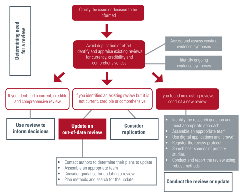Identify the research question and most appropriate approach
Evidence syntheses come in many forms and the preferred methodological approach varies accordingly. Identifying the question accurately is sometimes straightforward, but in most cases a thoughtful discussion and assessment of the context, concepts and challenges are beneficial. Exploration and engagement with those interested in the results of the review will improve the quality and utility of the output. This may include funders of the review, policymakers, providers and users of relevant services, and other stakeholders.
Developing a review question
General resources for developing a review question:
- Developing a research question
A research guide produced by the University of Maryland
- Research question frameworks
A research guide produced by the Welch Medical Library, Johns Hopkins University
Organizations that are publishing lists of high priority questions on which they are seeking researchers include:
- Cochrane (formerly available at https://covidrapidreviews.cochrane.org/search/site)
Determine the type of evidence synthesis
The following resource and research article aim to guide researchers in determining the appropriate methods for their review:
- What review is right for you?
Algorithm developed by the Knowledge Translation Program of the Li Ka Shing Knowledge Institute, St. Michael’s Hospital, Toronto, Canada
- What kind of review should I conduct?
Munn Z, Stern C, Aromataris E et al. What kind of systematic review should I conduct? A proposed typology and guidance for systematic reviewers in the medical and health sciences. BMC Med Res Methodol 2018; 18:5 (2018).
Consider how the review is most likely to have a positive impact on decision-making
Engaging with those decision-makers who are most likely to be influenced by the review is valuable in guiding decisions about how the review is conducted and reported. Where possible, this should form part of the preparation work so that it can inform the subsequent review from the outset. Such engagement may inform critical elements of the review’s conception, lead to co-production of the review with key stakeholders, and may influence decisions about the packaging of the completed review designed to achieve maximum impact.
Download a PDF of 'Resources for researchers considering and conducting COVID-19 evidence syntheses'
View the interactive flow diagram

